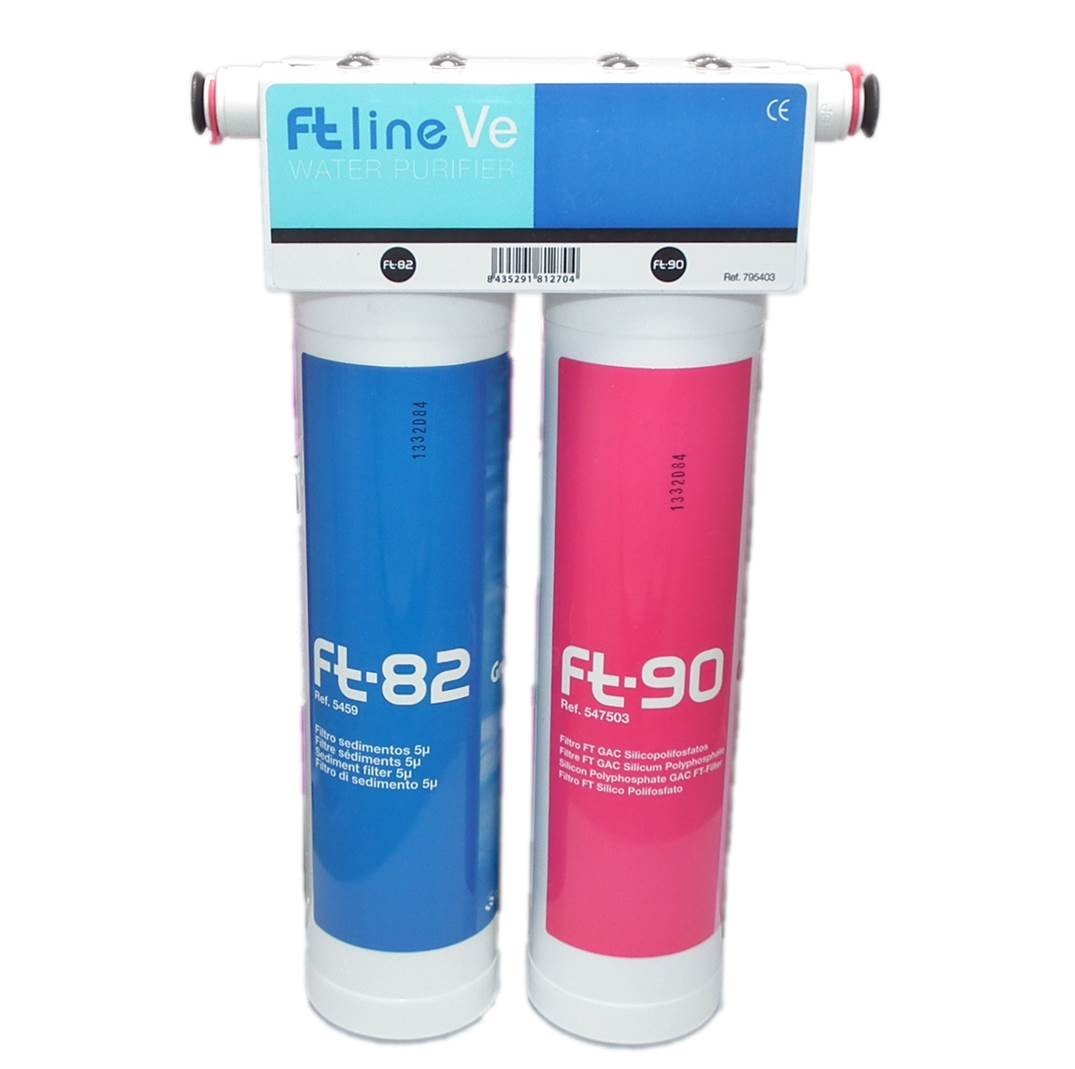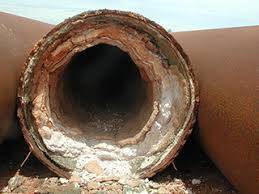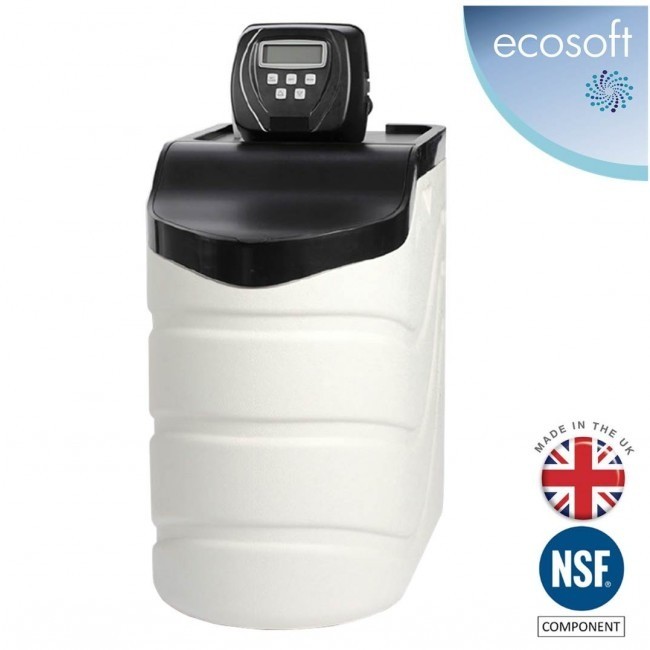If you live in a hard water area you are probably only too aware of the problems that the resulting limescale can bring and the damage it can do to kitchen appliances, boilers, pipework etc.
There are solutions however and various limescale treatment options in how to prevent this problem in your water supply allowing you to start enjoying a limescale free existence in your home.
In this article we look at the issues and their solutions…
What is Limescale?
Limescale occurs when dissolved compounds of calcium (mostly calcium carbonate CaCO3) and magnesium come out of solution and adhere to surfaces forming a hard milky white deposit. Water containing calcium and magnesium compounds is referred to as ‘hard water’ as opposed to ‘soft water’.
It forms most easily on hot surfaces such as heating elements in kettles, washing machines boilers and hot water pipes etc but can also be seen left behind after evaporation.
Unfortunately limescale likes depositing on existing limescale and can build up very quickly.
Carbonate hardness is sometimes referred to as temporary hardness because it can be removed by boiling water. Non-carbonate hardness occurs with the presence of certain dissolved metals including aluminum, barium, strontium, iron, zinc, and manganese and cannot be broken down by boiling the water, so it is also known as permanent hardness. In general, it is necessary to distinguish between the two types of hardness because the removal method differs for the two but that which most commonly encountered as a problem is the temporary hardness which is responsible for the visible scaling issues. (1)
What Are The Problems?
Limescale deposits can very quickly begin to affect the efficiency of appliances, coating the heating elements and reducing their energy efficiency requiring longer heating times and more electricity significantly increasing your heating bill.
Hard water can also lead to:
- Deposits on taps
- Clogging of showerheads
- Reduction in pipe diameter leading to constriction and reduced flow rates
- Poor lathering of soaps & detergents
- Coarser feeling hair
- Skin irritation in certain sensitive individuals
Additionally, hot beverages such as tea & coffee may encounter unsightly scum on the surface or fine chalky flakes may be present.
Clothes washed in hard water may be coarser than those in soft water and hard water works to reduce lathering of soaps & detergents.
However, it is important to realise that hard water resulting from the presence of calcium (rather than the metals) is not of itself detrimental to health, indeed the mineral content of such water may have a slightly beneficial effect with a raised pH.
Conversely there is evidence that limescale may encourage the build up of pathogenic bacteria in pipes & appliances which would be a cause for concern and necessitate the use of a filter capable of effectively dealing with bacteria & other micro-organisms.
(1) https://www.ncbi.nlm.nih.gov/pmc/articles/PMC3775162/
Limescale Treatment & Prevention
There are a number of different options to choose from when dealing with limescale and the choice in systems will depend on a number of factors including:
– Severity of the problem – hardness of the water.
– Systems affected – where is it important to prevent the limescale?
– The desired effect – are you just wanting to prevent scale or is softened water required?
The options available are:
- A traditional water softener. A salt based plumbed in system.
- A non salt or liquid water softener.
- A limescale inhibitor.
- A Water Filter which also reduces limescale.
We will look at the pros & cons of each method of scale treatment.
1. Traditional Water Softeners
These are perhaps the best known solutions to scale & hard water and have been in use for many years and are available as either electronic or non electronic systems.This type of softener work by a method known as ion exchange where the minerals in the water are exchanged for sodium.
A typical water softener will consist of a mineral tank and a brine tank. The mineral tank is filled with small polystyrene beads, also known as zeolite or resin which carry a negative charge. As both calcium and magnesium carry positive charges the minerals cling to the negatively charged beads. Sodium also has a negative charge and the saturation of the beads with a concentrated brine solution from the brine tank displaces the calcium & magnesium from the beads.
The system then regenerates through backwashing & recharging; this is automatic on modern softener systems and is determined either by an electrical timer which flushes on a regular basis or a metered system which regenerates based on water volume. Soft water is not available during recharging for this type.
The other method is by means of a computerised control which senses the amount of water used. And once enough has passed through the mineral tank to have depleted the beads of sodium, the computer triggers the regeneration cycle. This method allows for limited soft water during recharge.
These two methods are require an electrical connection
There is a third type of control which employs a mechanical water meter to measure water usage begin the recharging process. This has the advantage that no electrical components are required and the mineral tank is recharged only when needed. When it is equipped with two mineral tanks, softened water is always available, even during recharging.
It is a requirement of the water regulations in the UK that where a salt based softener is installed a separate unsoftened source of water must be supplied to the main kitchen drinking water tap.
Pros:
- Produces truley softened, silky water
- Excellent lathering of soaps & detergents
- Heavy duty systems that do an excellent job at removing hardness
- Wide choice of system types
Cons:
- More expensive than liquid softeners to install
- Require regular topping up with salt – time & cost
- Take up more space
- Wastes a significant amount of water
-
Non Salt or Liquid Water Softener

This type of softener is quickly gaining in popularity in the UK due both to its lower installation costs and the simplicity and economy of operation.
This system uses mechanical dosing pumps which inject a small amount AcquaSIL softening liquid, a non toxic food grade hexapolyphosphate into the water which is similar to the media employed in the popular brita filters, and also in many coffee shop filter units. coats the mineral ions preventing them from forming on surfaces, this allows them to pass unhindered through the system without attaching to pipes and appliances.
The Acqua Brevetti liquid softeners are simple to fit often taking less than 1/2hr to install and use a simple replaceable pouch which is very economical. The 1000 gram refill pouch for example lasts up to 12 months and will treat up to 44 cubic metres of water. There are also a 250 gram bags available which come supplied in boxes of 4, with each pouch treating 11 cubic metres of water and lasting 3 months each.
It should be noted that unlike a salt based softener this method of limescale prevention does not have any effect on the lathering of soaps or detergents.
Using no salt, producing no waste, and with little or no maintenance, these systems represent a far more practical and environmentally friendly solution to the problem of scale.
.
Pros:
- Easily fitted – no separate drinking water supply required
- Takes up vey little space
- Easy to maintain – just exchange the liquid pouch
- Cheap to run – as little as £32 per year
- More hygenic – there is no sludge build up
- produces no waste water
- Uses no electricity
Cons:
- Not a true ‘softener’ – has no effect on the lathering of soaps
- Scale crystalls remain in the water (but do not adhere)
3. Anti Scale Systems

Anti scale systems prevent scale by transforming dissolved hardness minerals into harmless, inactive microscopic crystal particles. These crystals remain suspended in the water and are do not adhere to heating surfaces. These systems require very little maintenance, no backwashing, no salt and no electricity.
Typical hardness problems, especially build-up of scale in heating elements, pipes, water heaters, boilers and on fixtures are no longer a concern.
This type of scale prevention device does not add chemicals. It is a scale prevention method with proven third party laboratory test data and years of successful commercial, residential and food service applications. Independent scientific testing has confirmed Template Assisted Crystallization (TAC) technology provides scale reduction of over 95+%.
Typically experienced hardness problems, particularly build-up of scale in heating elements, pipes, water heaters, boilers and on fixtures is a thing of the past.
Pros:
- Relatively easy to install
- Produces no waste water
- Uses no electricity
- Very little mainenance required – change cartridge every 2 years or replace media every 3 years (larger models)
- Retains beneficial calcium
- No chemicals added to the water
- No separate drinking water pipework required
Cons:
- Not a true softener in that it will not increase lathering of soaps & detergents
- Hydrogen sulphide, iron and manganese pre-treatment required if present in the water
4. Active Ceramics and Other Water Filters

There are a number of water filter systems which include the ability to prevent scaling. These range from the small single cartridge filters such as the FT-Line 90 coffee machine filter up to multi housing whole house water filters such as the Osmio PRO-lll Ultimate whole house filter system.
If your main or only concern is limescale prevention then probably one of the first three dedicated softener options would be your best choice. If however you are installing a water filter system in your home but also have a problem with limescale that you wish to overcome then these scale reducing water filters make an excellent solution.
Many of these employ the active ceramics media, a mixture of four different types of ceramic balls which each play a different role in the filtration process.
Apart from providing a very high degree of filtration of a vast range of contaminants they also have the effect of reducing scale which they achieve by crystallising the scale minerals to prevent their adhesion to surfaces. This method retains the beneficial calcium in the water but without the associated problems.
Other systems provided by Puriflow such as the popular FT-Line VE twin cartridge water filter system use silico-polyphosphates to deal with limescale. The FT-Line VE system is a favorite choice of cafes & restaurants as it is ideally suited as a filter for coffee machines where, as well as providing excellent water for coffee, it also protects the machine from scaling and the associated expensive breakdowns.

Pros:
- Cost effective – provide water filtration and scale reduction at the same time.
- Wastes no water.
- Do not add chemicals to the water.
- Economical to maintain – the active ceramics cartridges will last 2-3 years before replacement.
Cons:
- May not provide the same level of scale removal as other methods.
- If general water filtration is not a requirement then you would be paying for functions that were not needed.
There are then a number of options to choose from when selecting a scale treatment system for your home and your choice will depend on the factors highlighted above. Such factors as available space, initial cost, running cost and what you are aiming to achieve will all influence your decision.
You can be sure that all the systems offered by Puriflow are all quality products which will give many years dependable service and include free delivery to mainland UK* and are covered by our 90 day money back guarantee.

If you wish to discuss your options further please do contact us on 020-3507-1879 or by e-mail at: info@puriflowfilters.co.uk
*Islands & certain remote areas may be subject to a surcharge where under £50 value. Now includes free delivery to the Republic of Ireland and certain European countries on orders over £60.







